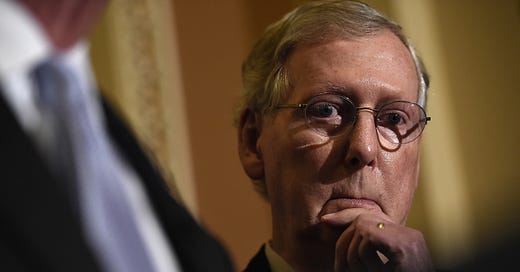Rick Scott is in a difficult position. As chairman of the National Republican Senatorial Committee, his job is to elect Republicans to the Senate. But the unwritten rule is that he is expected to do this and protect incumbents—and sometimes those goals are in conflict.
Consider Lisa Murkowski. The senior senator from Alaska is up for re-election this cycle. In the last cycle, she handily defeated the Trump- and Palin-supported Libertarian party candidate, Joe Miller. Six years earlier, though, in 2010, Miller had primaried Murkowski on the right and won the GOP nomination—in response to which Murkowski ran as a write-in Republican in the general election and . . . won! Turns out that being an appropriator who cares about your state’s best interests resonates with voters.
The 2010 race was an aberration, and it put the NRSC in an awkward position: Should it side with the GOP incumbent or the GOP nominee? Murkowski—despite having first come to the Senate controversially, as a 2002 appointment by her father, the state’s governor—is a native who knows the state’s issues, cares about the nitty-gritty things like casework, and is skilled at commandeering money for Alaska. But Miller was, by 2,006 votes, the party’s nominee.
Ultimately, the NRSC pretended Murkowski did not exist, cutting ads for Miller. The NRSC even helped pay for Miller’s failed general-election recount efforts against Murkowski.
All of which is to say that, while the goal of the NRSC is to elect Republicans, the messy realities of politics mean that some of the decisions that have to be made aren’t cut and dry.
While senators step up for two-year terms to be the figurehead for the NRSC—Rick Scott at the moment, and over the last fourteen years Todd Young, Cory Gardner, Roger Wicker, Jerry Moran, John Cornyn (who was chairman during the Murkowski campaign of 2010), and John Ensign. But over those fourteen years, the NRSC has really been directed by Senate Republican Leader Mitch McConnell. No NRSC chairman could cross him and live to tell the tale.
Of course, well-funded outsiders routinely challenge McConnell’s role as kingmaker. Former Senator Jim DeMint from South Carolina and his Senate Conservatives Fund, for example.
This go-around, Murkowski isn’t the problem: She has the NRSC’s support, even though former President Trump has endorsed her opponent in the primary.
No, the problem facing the NRSC going into 2022 is the rise of allegedly abusive candidates. Here’s reporter John Wagner in the Washington Post:
Sen. Rick Scott, who heads the group that works to elect Senate Republicans, declined Monday to say whether Sean Parnell, a GOP hopeful in Pennsylvania who has been accused of strangling his wife and abusing his children, is the right candidate for the job.
Scott . . . was asked about the candidacy of Parnell, who has been endorsed by former president Donald Trump, during an interview on CNN. Scott maintained that in his role as NRSC chairman he should remain neutral in primaries, except in the cases of GOP incumbents.
“We’ll see who comes out of the primary,” Scott said. “Facts will come out. We’ll find out exactly what people think. I think what ultimately happens is people are going to look at somebody’s background and say is that the type of person they want and also are they talking about the issues I care about.” Other potential problems beyond Parnell? Herschel Walker. Eric Greitens.
Herein lies the fundamental tension between Mitch McConnell and Donald Trump: McConnell wants the candidate (he thinks is) most likely to win to be the nominee. Donald Trump wants the nominee to be the person who has demonstrated the most fealty to him.
These are not good choices given the races McConnell needs to win to become, once again, Senate majority leader. Looking at these Trump-endorsed candidates in Senate primary races, we’re left to wonder: “Where are all the good men dead—in the heart or in the head?”
Correction: An earlier version of this story incorrectly stated that Murkowski ran as an independent in 2010. She ran as a write-in Republican.











